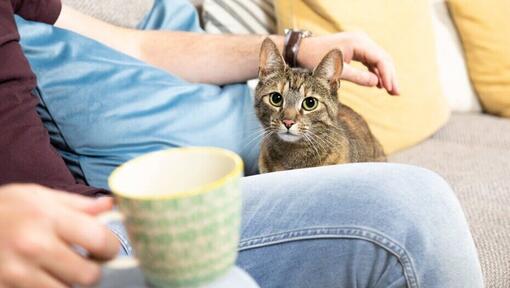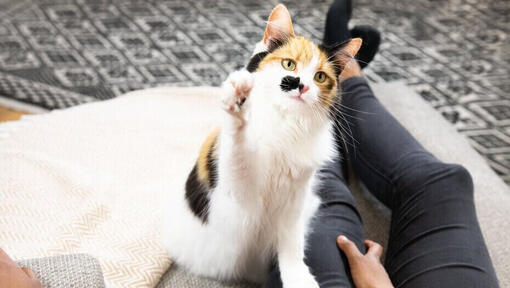

There are so many benefits to adopting a cat, namely that you're giving a pet a second chance at a fulfilled family life! If you're wondering how to adopt a cat and what to expect during the process, read our guide.
You've decided to give a cat from a shelter a forever home-a fantastic thing to do! There are so many pets in the UK that have been abandoned, abused or simply had owners that were no longer able to take care of them. All of these animals are looking for a second chance at a loving home.
Whether you're looking to adopt a kitten or an adult cat with a fully formed, unique personality, there are many things to consider before bringing your new family member home. Find out how to adopt a cat and what you'll need for your new arrival with this guide.
How to adopt a cat
When considering how to adopt a cat, the first thing you need to do is locate a suitable shelter or charity with an established reputation. You can easily find plenty of these by searching for your local centres online. You can also try looking on Cats Protection, Blue Cross and RSPCA websites for your closest rescue centre to you. Once you've located one, most have online directories of the cats they currently have up for adoption, alternatively you can speak to the staff at the centre for advice on the kind of cat which will suit you.
One thing to be aware of is that most adoption centres will arrange a home visit before you officially adopt a cat to make sure that it's a suitable environment. If you have other pets or family members, they may also want them to go to the initial visits to ensure you all get along.
Finding the perfect cat
One of the most important things when adopting a cat is to make sure that they have the right personality to fit in with your existing family. Shelters will be able to provide you with a detailed history of their residents' backgrounds, as well as advising on which of their cats might suit your family best.
Just like deciding whether to adopt a cat or acquire a kitten, choosing what breed of cat is right for you is a really important consideration. Although personality traits vary between individual cats, you can learn a lot from breed type.
Rescue centres will often have a variety of breeds to choose from, including wonderful moggies (domestic short hair or long hair cats) too! Read up on the various choices, and talk to staff at your local rehoming centre. They will have a lot of insight into what breed might be right for you. You can also read more information about different types of cats with our cat breed library.
Whether you are planning to adopt a kitten from a rescue centre or choose one from a litter, it is important to check that she is in good health. Firstly, kittens should not be separated from their mothers until they are fully weaned. This is usually around 9 weeks of age.
Looking at the kitten straight on, she should have clean, clear eyes with no discharge, as this could indicate a respiratory problem. Her nose should be clear, cool, slightly damp, and clear from mucus or signs of sneezing. Her ears should be clean and pink - black specks and a dark brown, waxy discharge in the ear canal may indicate ear mites. Although mites are easily treated, it could suggest the kittens are being poorly cared for.
Next, take a wider look of the kitten. How does her tummy look? A swollen tummy could be caused by poor nutrition or worms. You should also check her behind for any evidence of diarrhoea. Her coat should be glossy with no signs of matting, and her legs should be straight and well formed, allowing her to move around and jump with ease.
Also check how she interacts with the other kittens and her mother. A healthy kitten should be alert and inquisitive to her surroundings.
How would you like your cat to be? Adventurous or shy? Do you prefer a lap cat or a ball of energy? Ask yourself which you'd prefer, and see if there are any personality traits you can distinguish based on behaviour. When you pick the cat up, does she cuddle in to you or wriggle free to keep exploring?
Adopting a cat: considering all the costs
Does it cost money to adopt a cat?
The cost of adopting a kitten or cat varies depending on the organisation or cat rescue centre you choose. Most shelters ask for an adoption fee to be paid before you take your pet home and the cost of this varies between organisations. This fee covers the care and treatment your cat received during its time at the centre - including initial veterinary costs such as neutering/spaying and kitten vaccinations.
However, you should consider other costs as well. In preparation for the arrival of your new pet, you will need to buy pet food and dishes, a bed, litter box, litter and probably a cat carrier for transporting her home. You may also want to purchase some cat toys, although you can easily make your own.
Preparing for the unexpected
Probably the biggest cost to take into consideration is veterinary bills. Certain bills are planned, such as vaccinations, de-worming and flea prevention. You may also want to microchip your kitten if she goes outside, so she can be found and recognised if she gets lost.
But it is the unexpected vet bills which can prove most expensive. The cost of treatment, or even a stay at the clinic following an accident or illness, can run into the thousands. Although a monthly cost, cat insurance, where available, can help you cover unplanned veterinary bills.
An often forgotten cost when budgeting is the price of boarding if you go away on holiday. Perhaps you have friends or family able to care for your pet while you are away, but if not, it is another expense to consider.
What do I do if I find a stray cat?
If you find a stray cat in your neighbourhood, you should ask around to see if you can find its owner. Also try putting up posters or asking on social media. It's also a good idea to take them to the vet asap so they can check if they have a microchip. For more information on stray cats, read our guide.
Cat adoption checklist
The following cat adoption checklist features some of the things you should consider when adopting your feline friend.
What is your home like?
If you have a lot of safe, outdoor space then consider rehoming an outdoor cat. If you live in a flat, an indoor cat will be better used to living in such a space.
How busy is your lifestyle?
If you're out of the house often, a cat that is known to be quite independent may be a happier fit for your lifestyle. Similarly, if you're short on time, choose a breed with less grooming requirements.
Do you already have pets?
Some cats get on well with other animals, whereas others prefer to be more solitary. If you already have other pets, make sure you're choosing a cat that will get on well with them.
Do you have young children?
Some cats may have had experiences in their lives that make them more shy or reclusive. If you have a family with young children, try to find a cat that will enjoy all the attention they're going to receive!
Consider the bills
It's truly a wonderful thing to rehome a senior cat, or a cat with a health condition. Shelters will always make you aware of any long-term ailments, but make sure that you can shoulder the cost of any on-going veterinary treatment or any cat essentials, before committing to taking care of a cat.
That's our guide to cat adoption! Looking to get a new kitten or cat from a breeder instead? Read our guide.















